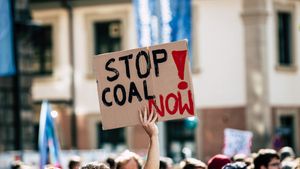A United States envoy has raised hopes for an impending truce between Israel and Hezbollah, emphasizing significant strides made during talks held recently in Lebanon. Amos Hochstein, the Biden administration's special envoy, stated, "We are now within our grasp of securing an agreement as discussions progress." His optimistic remarks come on the heels of continued violence across the region, particularly concerning the humanitarian crisis simmering within Gaza, as looting dramatically worsens the battle for resources.
Hochstein's meetings included discussions with top officials and representatives from Hezbollah, whose leadership has reportedly shown willingness to engage meaningfully with the proposed truce outlines. Plans suggest both Israeli and Hezbollah ground forces would withdraw from designated UN-policed buffer zones, allowing for increased peacekeeping presence to stabilize this conflict-riddled area.
The mood, starkly contrasting the discussions featuring the potential ceasefire, reveals the desperate humanitarian catastrophe currently engulfing Gaza. The looting of nearly 100 aid trucks has compounded the already dire food shortages. Activists and local leaders are bracing for long-term repercussions as they struggle to cope with the consequences of both war and lack of aid.
According to local NGOs and reports from the Palestinian Red Crescent, the effects of the violence have been devastating, with food resources critically limited. Hospitals have seen significant decreases in operational capacity due to resource shortages, prompting urgent calls for international assistance. Frantic voices echo within the borders of Gaza, urging for immediate intervention to alleviate the continuous suffering.
Hezbollah, meanwhile, isn’t remaining idle, demonstrating its military might by launching guided missiles at Israeli positions, showcasing the tensions still raging along the Lebanon-Israel border. After claiming responsibility for attacks on armed forces, Hezbollah has escalated its offensives, significantly complicative to any peacemaking efforts. Such actions beg the question: Has the prospect of establishing calm shifted too far from reach? This renewed violence yields fears of reverting to full-scale confrontations.
Alongside Hochstein's optimistic takes, Israeli officials have maintained resolute commitments to locate hostages reportedly held by Hamas across Gaza. Prime Minister Binyamin Netanyahu announced rewards reaching up to $5 million for the return of each hostage, emphasizing Israel’s unwavering commitment to recovering its citizens.
This complex backdrop raises urgent concerns not just from military perspectives but also humanitarian ones. The dire food shortages and the associated public health challenges complicate any potential solutions.
Responses from local leaders have highlighted the tremendous strain on civilians, who are grappling with not just military conflicts, but also increasing scarcity of basic necessities resulting from escalated hostilities.
International forces, more committed than ever, are observing the playing field with anxiety. Reports indicate potential for increased UN peacekeeping forces as part of the truce planning. Yet, enthusiasm must contend with the reality of Hezbollah's potent military capabilities as demonstrated by recent missile strikes.
These tensions build against the backdrop of mounting political pressures for the Israeli leadership, compelling them to respond to both military and humanitarian demands. The dual urgency of securing peace whilst addressing humanitarian violations poses significant challenges yet to be surmounted.
Compounding the stakes, the region is observed under stressful socio-political engagements, where reports on the ground hint at potential shifts around Lebanon’s internal dynamics as they respond to international suggestions. Countries like Iran also loom large over this geopolitical chessboard, considering their support of Hezbollah, complicates the truce negotiations.
For the average Gaza citizen, waiting for change feels agonizingly slow. Daily narratives bleed with frustrations of inadequate access to food, potential violence, and the lost hopes for peace. Each food charity truck looted tells tales of not just physical hunger but cultural and emotional ramifications beyond comprehension.
According to Hochstein, improving situational awareness through enhanced intelligence and the involvement of local community leaders is integral to refining future humanitarian support. Yet, biting texts from local activists argue for immediate action, stating, "We’ve run out of time; people are dying. We need urgent international solidarity and for decision-makers to act before it’s too late."
The coming days and weeks are pivotal for both the proposed truce discussions and the, seemed irrepressibly, deteriorated humanitarian conditions across Gaza. The interaction between these distinct but interlinked spheres will significantly shape the potential for peace or escalation as both sides navigate their respective challenges.
Despite the rays of potential hope shining forth through Hochstein’s words, the cautionary tales of violence and humanitarian hardship amplify the questions: will the momentous pressures yield victory for diplomacy or unravel once again?



